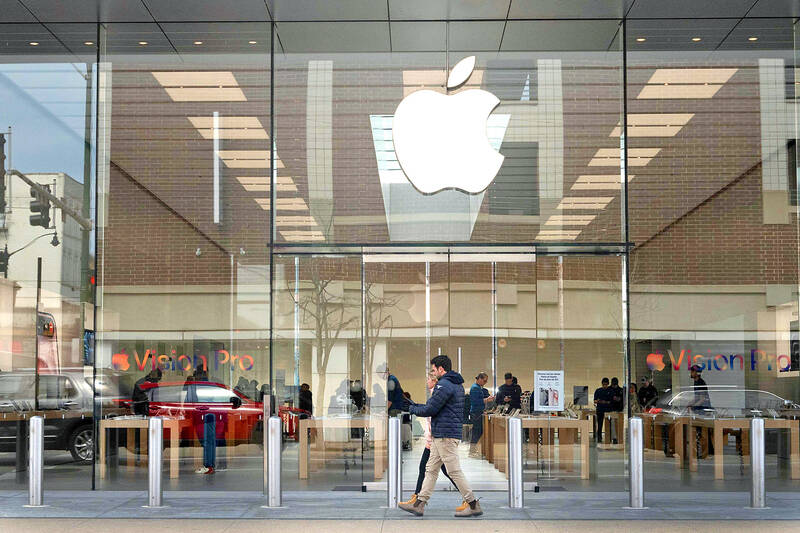Apple Inc has been developing a homegrown chip to run artificial intelligence (AI) tools in data centers, although it is unclear if the semiconductor would ever be deployed, the Wall Street Journal reported on Monday.
The effort would build on Apple’s previous efforts to make in-house chips, which run in its iPhones, Macs and other devices, according to the Journal, which cited unidentified people familiar with the matter.
The server project is code-named ACDC (Apple Chips in Data Center) within the company, aiming to utilize Apple’s expertise in chip design for the company’s server infrastructure, the newspaper said.

Photo: AFP
While this initiative has been in progress for several years, the exact timeline or potential release date remains uncertain, the report said.
The Cupertino, California-based company has been playing catch-up with its peers in generative AI, the technology underpinning chatbots and other popular new tools. The company is preparing to unveil a new strategy for AI at its Worldwide Developers Conference next month.
“We continue to feel very bullish about our opportunity in generative AI and we’re making significant investments,” Apple CEO Tim Cook said in an interview with Reuters last week.
Apple’s server chip would primarily focus on running AI models, a process known as inference, rather than training AI models.
The company has been working closely with Taiwan Semiconductor Manufacturing Co (台積電) to design and initiate production of the chips, although it is uncertain if the collaboration has delivered definitive results, the Journal reported.
Apple’s approach is expected to focus on new proactive features that can assist users in their daily lives. The company also has held talks with potential partners like Alphabet Inc’s Google and OpenAI to supply generative AI services.
If Apple goes ahead with its own server processor, it would follow several of the largest tech companies in doing so. Amazon.com Inc’s Amazon Web Services, Google, Microsoft Corp and Meta Platforms Inc all operate data centers that run on in-house designed semiconductors to some extent. Such efforts have eroded the traditional dominance of Intel Corp’s components.
Meanwhile, Apple planned to hold a virtual event yesterday in which it is expected to show new iPad models, some of which could come with a new chip aimed at speeding up AI tasks carried out on the devices.
Creative Strategies Inc analyst Carolina Milanesi said upgraded iPads could be a way for Apple to get new chips onto the market ahead of its developer conference next month, where it might reveal more about how it plans to address AI.
Additional reporting by Reuters

SEMICONDUCTORS: The German laser and plasma generator company will expand its local services as its specialized offerings support Taiwan’s semiconductor industries Trumpf SE + Co KG, a global leader in supplying laser technology and plasma generators used in chip production, is expanding its investments in Taiwan in an effort to deeply integrate into the global semiconductor supply chain in the pursuit of growth. The company, headquartered in Ditzingen, Germany, has invested significantly in a newly inaugurated regional technical center for plasma generators in Taoyuan, its latest expansion in Taiwan after being engaged in various industries for more than 25 years. The center, the first of its kind Trumpf built outside Germany, aims to serve customers from Taiwan, Japan, Southeast Asia and South Korea,

Nvidia Corp chief executive officer Jensen Huang (黃仁勳) on Monday introduced the company’s latest supercomputer platform, featuring six new chips made by Taiwan Semiconductor Manufacturing Co (TSMC, 台積電), saying that it is now “in full production.” “If Vera Rubin is going to be in time for this year, it must be in production by now, and so, today I can tell you that Vera Rubin is in full production,” Huang said during his keynote speech at CES in Las Vegas. The rollout of six concurrent chips for Vera Rubin — the company’s next-generation artificial intelligence (AI) computing platform — marks a strategic

Gasoline and diesel prices at domestic fuel stations are to fall NT$0.2 per liter this week, down for a second consecutive week, CPC Corp, Taiwan (台灣中油) and Formosa Petrochemical Corp (台塑石化) announced yesterday. Effective today, gasoline prices at CPC and Formosa stations are to drop to NT$26.4, NT$27.9 and NT$29.9 per liter for 92, 95 and 98-octane unleaded gasoline respectively, the companies said in separate statements. The price of premium diesel is to fall to NT$24.8 per liter at CPC stations and NT$24.6 at Formosa pumps, they said. The price adjustments came even as international crude oil prices rose last week, as traders

PRECEDENTED TIMES: In news that surely does not shock, AI and tech exports drove a banner for exports last year as Taiwan’s economic growth experienced a flood tide Taiwan’s exports delivered a blockbuster finish to last year with last month’s shipments rising at the second-highest pace on record as demand for artificial intelligence (AI) hardware and advanced computing remained strong, the Ministry of Finance said yesterday. Exports surged 43.4 percent from a year earlier to US$62.48 billion last month, extending growth to 26 consecutive months. Imports climbed 14.9 percent to US$43.04 billion, the second-highest monthly level historically, resulting in a trade surplus of US$19.43 billion — more than double that of the year before. Department of Statistics Director-General Beatrice Tsai (蔡美娜) described the performance as “surprisingly outstanding,” forecasting export growth